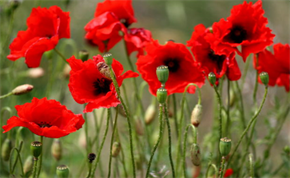
As we approach another Remembrance Day, it is important that we look back to understand the significance of its origins and why it still matters to us today.
The first Remembrance Day was conducted in 1919 throughout the Commonwealth and Britain. Originally called Armistice Day, it commemorated the end of hostilities of the Great War in 1918. It came to symbolise the end of the war and provide an opportunity to remember those who had died.
In a letter published in the London Evening News on 8th May 1919, Australian journalist Edward George Honey proposed a respectful silence to remember those who had given their lives in the Great War. This suggestion was brought to the attention of King George V, and on 7th November 1919, four days before the first anniversary of Armistice Day, King George V announced that a two-minute silence would be observed, and thus began Remembrance Day as we know it today.
"All locomotion should cease, so that, in perfect stillness, the thoughts of everyone may be concentrated on reverent remembrance of the glorious dead." - King George V
After the end of the Second World War in 194,5 Armistice Day became Remembrance Day to include all those who had fallen in the two World Wars and other conflicts. Now, this anniversary on the 11th of November is used to remember all the people who've fought and died in wars since World War I including World War II, the Falklands War, the Gulf War, and conflicts in Afghanistan and Iraq.
On Remembrance Day we still observe a two silence to pay our respects to the millions of heroes who served for, and protected, their country. We also thank all those who are currently serving, especially those deployed overseas, facing new dangers day after day.
Many of you will volunteer to support and celebrate events in your communities by laying a wreath on behalf of the trust on Remembrance Sunday; many of us will also have bought poppies and pin badges; these simple but important acts of Remembrance mean that we keep playing our part in reflection and remembrance. We are also once again proudly displaying poppies on our ambulance fleet. Thank you for all that you continue to do in support of our communities, and the patients that we meet.
We have created a Remembrance Teams background for use this week, which you can download here.
The National Service of Remembrance is held annually at the site of the Cenotaph in London on Remembrance Sunday (this is always the second Sunday of November).
Did you know..?
Cenotaph means 'empty tomb'. It symbolises the unprecedented losses suffered during the First World War and is dedicated to 'The Glorious Dead'. It commemorates the contribution of British and Commonwealth military and civilian servicemen and women in the two World Wars and later conflicts. There are no names inscribed on the Cenotaph, which allowed individuals to assign their own meaning to the memorial. It also provided a tangible place of mourning for those whose husbands, sons, brothers, friends and relations died during the war without a known grave.
Royal British Legion | Armed Forces Charity
Published 8th November 2022